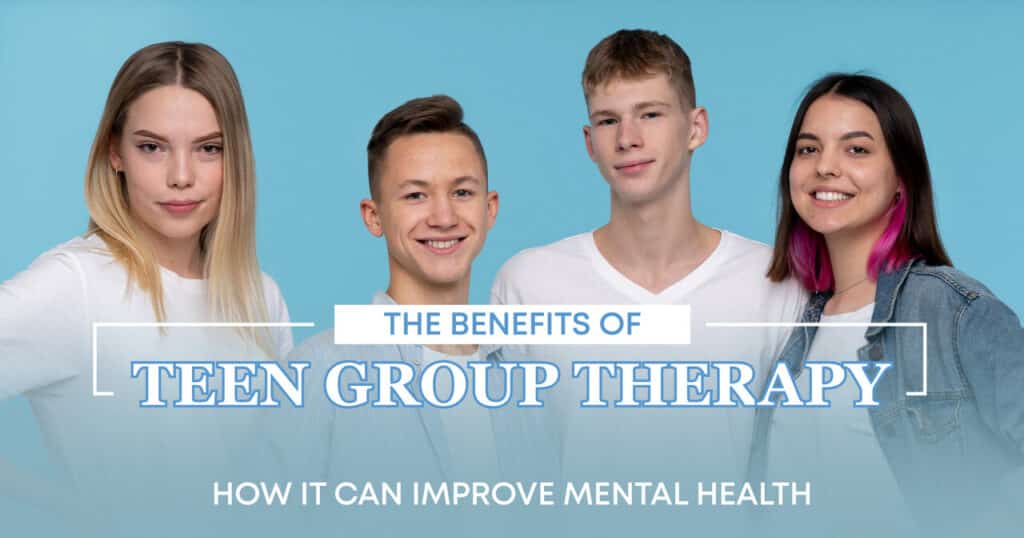The teenage years are a roller coaster of emotions, changes, and challenges. From academic pressures to social dynamics and personal identity struggles, it’s no wonder that many teens grapple with mental health issues. Many teens experience mental health conditions such as anxiety, depression, or Obsessive-Compulsive Disorder, and these can greatly impact their daily lives. However, one effective alternative to consider is group therapy. It provides a supportive environment where teens can enhance their social skills, improve communication skills, and develop healthy coping strategies.
What is Teen Group Therapy?
Group therapy is a type of therapy where a small group of individuals meets regularly to discuss and explore their issues under the guidance of a trained therapist. For teens, these groups typically consist of peers who are facing similar challenges, whether it’s mental health disorders, social issues, or family problems. It’s especially useful for teens struggling with common adolescent behaviors such as social anxiety, peer pressure, and emotional struggles.
In group therapy sessions, teens actively participate in discussions and activities, gaining personal growth through shared life experiences. Whether they’re dealing with family relationships or negative peer pressure, group therapy provides a safe environment to explore solutions.
Key Elements of Group Therapy
- Facilitator: A licensed therapist who guides the discussions and ensures a safe, respectful environment.
- Peer Support: Interaction with other teens who understand and share similar experiences.
- Structured Sessions: Regular meetings with a clear agenda and therapeutic goals.
- Confidentiality: A commitment to privacy, allowing teens to open up without fear of their issues being shared outside the group.
The Science Behind Group Therapy
Group therapy isn’t just a touchy-feely gathering; it’s grounded in research and effective strategies. When teens participate in group therapy, they benefit from several psychological mechanisms, improving their social skills and interpersonal skills, while enhancing emotional regulation skills. These group interactions can improve relationships and foster a stronger sense of belonging.
Research has shown that therapy activities focusing on emotional regulation, conflict resolution skills, and analysis of motor skills can aid in the treatment of adolescents, particularly those with emotional or internal struggles.
Therapeutic Factors
- Universality: Realizing they’re not alone in their struggles can be incredibly comforting for teens.
- Altruism: Helping others in the group boosts self-esteem and creates a sense of purpose.
- Imparting Information: Learning from the therapist and peers can provide new coping strategies and insights.
- Social Skills Development: Practicing communication and interpersonal relationships in a safe environment can translate to better interactions outside the group. Many participants report enhanced interpersonal skills and healthier relationships with family members and peers.
The Benefits of Teen Group Therapy: How It Can Improve Mental Health
Teen group therapy offers a unique set of advantages that can significantly improve a teenager’s mental health journey, addressing mental health concerns and challenges with peers in a supportive setting.
Emotional Support
One of the primary benefits of therapy for teens is the emotional support it provides. Adolescents often feel isolated in their struggles, but hearing similar experiences from others can be incredibly validating and reassuring.
Improved Communication Skills
Group therapy encourages active participation and active listening, enabling teens to articulate their thoughts and feelings more effectively. This practice can improve their family relationships and social functioning in everyday life.
Techniques Used in Teen Group Therapy
Different groups might use varying approaches, but some common techniques are particularly effective for teens.
Cognitive Behavioral Therapy (CBT)
Cognitive Behavioral Therapy helps teens identify and change negative thought patterns. In a therapy setting, they can see how these patterns play out in others and learn practical ways to shift their thinking, benefiting their mental health treatment.
Dialectical Behavior Therapy (DBT)
Dialectical Behavior Therapy is especially useful for teens dealing with strong emotions or self-harm. Group sessions often include skills training in mindfulness, distress tolerance, emotional regulation, and interpersonal effectiveness. It’s particularly effective in addressing common group therapy topics like managing anxiety disorders and the challenges of social anxiety.
Expressive Therapies
Incorporating art, music, or writing into group therapy can help teens express themselves nonverbally. Creative expression through these methods fosters emotional growth and healthier relationships.
Group therapy in schools and community centers often combines creative methods like role-playing and expressive therapies with analysis techniques such as conversation turn-taking. These approaches help develop effective communication strategies and increased self-esteem levels.
Real-Life Applications and Success Stories
Teen group therapy has been used in many clinical settings, including schools, hospitals, and private practices. In some cases, group therapy is part of an Intensive Outpatient Program (IOP) for teens needing structured, consistent support for their mental health disorders.
School-Based Group Therapy
Many schools have implemented group therapy programs to support students dealing with stress, bullying, or academic pressure. These programs have improved attendance, grades, and emotional well-being.
Community Programs
Community centers often offer group therapy for teens facing various issues. These programs are effective alternatives for adolescents experiencing challenges with peers, anxiety, and constant pressure in their social circles.
Getting Started with Teen Group Therapy
If you’re considering teen group therapy, here’s how to get started:
Finding the Right Group
Look for a group led by a licensed therapist with experience in adolescent mental health. Therapy programs like Lincoln Park Therapy Group or Charlie Health offer options for in-person and online therapy services, which can provide more flexibility for teens facing mental health issues.
Teens benefit most from group therapy when it complements individual therapy sessions. This combination allows them to work through their personal struggles and mental health challenges while learning to navigate interactions between peers in a supportive group setting.
FAQs
What if my teen is shy or introverted?
Many teens feel anxious about joining a group, but therapists are skilled at creating a welcoming environment. Shy teens often find comfort in the structure and support of group therapy.
How long does a group therapy session last?
Each session lasts 60 to 90 minutes and is held weekly. The duration of participation can vary, but many programs recommend at least 8-12 weeks.
Can group therapy replace individual therapy?
Group therapy is a valuable complement to individual therapy but not necessarily a replacement. Some teens benefit from both forms of therapy to address their needs comprehensively.
Does insurance cover group therapy?
Different insurance plans cover different things. It’s wise to talk to your insurance company and the therapist to know what’s covered.
What if my teen doesn’t like the group?
It’s essential to give it a fair chance. However, if the teen feels it’s not helpful after several sessions, discuss other options with the therapist. Finding the right fit is crucial.
Wrapping It Up
Group therapy offers a supportive setting for teens to explore their emotions, develop healthier relationships, and practice coping skills that will help them in their adolescent and adult life. By sharing their struggles and successes with peers, teens can better navigate daily life challenges and become healthy adults. Whether through school-based programs, community programs, or private practices, the benefits of teen group therapy can improve communication skills, build resilience, and reduce symptoms of mental health disorders




